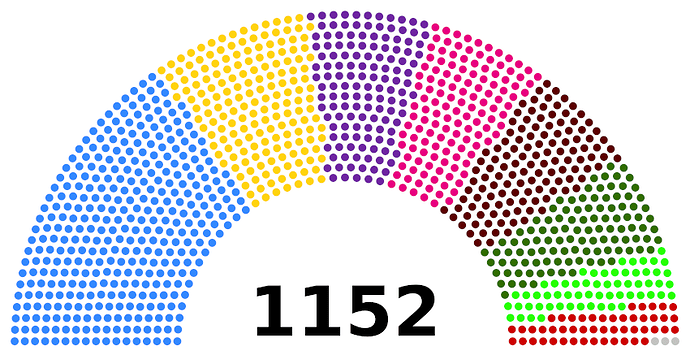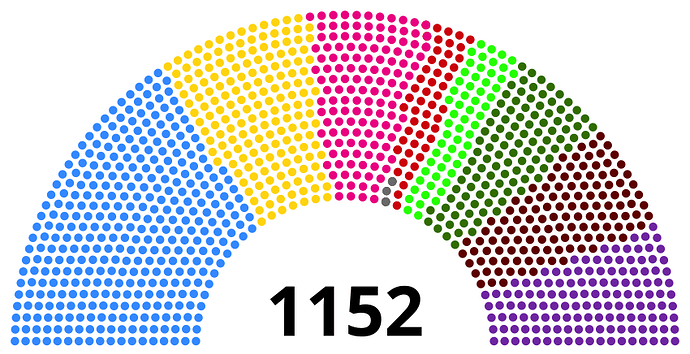
“Long Overdue”—Diet Legalizes Acronian National Anthem, Advances Mobile Payment Legislation with Enormous Margins
NUVRENON— It was a blockbuster day at the National Diet on Tuesday, and an emotional one, after Delegates across the partisan divide voted by overwhelming margins to approve two landmark measures. In one, the Diet granted fast-track status to legislation proposed by the Prime Minister to legalize mobile payment applications, whose illegality has been decried for years as an example of why the Tavari economy seems to lag behind other developed economies in matters of technology. In the second, the Diet voted almost unanimously to overrule a three-century old court ruling forbidding the public performance of a controversial Akronist hymn, “No Line but Akrona,” which in 2022 the newly-established Acronis selected as its national anthem. While not related to one another, the two items both represent major paradigm shifts in Tavari law and society Prime Minister Žarís Nevran Alandar called “long overdue.”
The Banking Modernisation Act of 2024 was brought by the Prime Minister today to, as she said in brief remarks after the day’s first vote, “rectify a 40-year old error that has, unintentionally, hamstrung an entire generation.” In 1984, a law also called the Banking Modernisation Act championed by famed reformer Bežra Išdašt Tovrenar required Tavari banks to cease using the public telephone network for financial transactions and to set up and maintain their own network, at their expense, by quite literally running new wires from bank to bank. Mobile payment apps—like Debby, PrimPay, BAST RecanPass, and Blast!Pay by BajaTech, all common elsewhere on Urth—were unknown at the time the law was passed, but because the law explicitly forbade using phone networks from carrying financial transactions, they have heretofore been illegal in Tavaris. Tuesday’s “fast-track” motion does not immediately change that, but it does mean the bill will spend far less time in the Diet: the stage of committee deliberation has been waived, allowing the bill to proceed directly to the whole Diet for consideration. Both the Prime Minister’s Irínavi Voi! and the official opposition Socialist Green Party for Democracy voted for the measure, which required and well exceeded a two-thirds majority—not a problem with the two largest blocs in the Diet agreeing, as the measure attained 1,000 votes in favor to just 40 opposed. The bill will require two readings before the house, but the third is almost always a formality, and the Prime Minister estimated that the bill could be in front of the Emperor for Royal Assent “in two weeks or less.”
The Banking Modernisation Act of 1984 is widely considered to have been a poor decision on the part of otherwise generally quite popular Bežra Išdašt Tovrenar, was blamed in part for the 1985 collapse of what was then the largest bank in the country, Western Bank and Trust, and its parent conglomerate the Rundra Group, the largest company of any kind in the country. Ms. Išdašt Tovrenar lost an election later that year, largely due to the fallout from the Rundra Group bankruptcy. Prime Minister Nevran Alandar, who cites Ms. Išdašt Tovrenar as one of her primary political role models, named her legislation after the 1984 law deliberately as a way of correcting what she called “a huge mistake.” “Today’s bill represents real modernisation, true modernisation, and rectifies the huge mistake we made forty years ago. Now, we are one step further away from the analog past and one step closer to the digital future,” said the Prime Minister.
But it was the day’s second vote that gathered the most attention and even brought tears to the eyes of many both in the Diet and watching from the gallery. Her Most Esteemed Beneficence Matron Vana Dandreal was watching as the Diet voted by an even greater margin, 1127-25, to overrule the 1713 court ruling that outlawed the hymn “No Line but Akrona,” using a legal mechanism known as “entrenchment” that, with a two-thirds majority of the Diet, requires the courts to treat the law as equivalent in force to the constitution. The 1713 court ruling was made in the days before Tavaris established its modern judicial system in the 19th century, and was in fact issued by the Chief of Oren in the judicial capacity that was then afforded to all the hereditary Chiefs of each Tavari Line. In those days, Chiefs were responsible for matters of law in their jurisdictions and had the power to organize their own judicial systems on their lands and even sit in judgment themselves. The Chiefs of Oren, based in the Motai region since time immemorial, were long known for what would today be called conservative, right-wing, nationalist, and anti-Akronist politics, and in 1713, Chief Gamdi of Oren ruled that a man arrested for attacking and grievously wounding an Akronist who was singing the song to herself on the street had committed no crime because the song was an “incitement to violence” and “treason.”
At that time, appeals to judicial verdicts issued by Chiefs could be made to the entire body of assembled Chiefs and, after that, to the King. It was the common practice at the time for the Chiefs to select a random handful of their own number as “judicial chiefs” to hear appeals, but both the panel so convened in 1713 and King Kanor IV declined to weigh in on the issue, thus permitting the Chief of Oren’s ruling to stand. Still in the early 18th century, and for more than a century afterward, the population of Akronists outside western Tavaris and the colonies was quite small, less than one in twelve, and there was little pressure on authorities to heed calls for expanding Akronist civil rights. On the contrary, Akronism was morally opposed by most in power at the time, and there was little sympathy for the victim in the case due in no small part to the subject matter of the hymn in question, which was and by some still is considered deeply objectionable.
“No Line but Akrona” dates to the year 1495, the peak of a mass Akronist social, political, and religious movement called by some a rebellion or revolution known as Line Akrona. Dating to about two decades before then, the Line Akrona movement called upon Akronists to shun all association with any previous Line or Chief but instead to swear allegiance only to the goddess Akrona. Members cast aside their former identities and preached a message of egalitarianism, with all equal under Akrona. The institution of the Lines and their Chiefs were already well-entrenched in Tavari society, culture, and most relevantly, law by that time—the Chiefs enforced most law, and to defy allegiance to a Chief was to claim immunity from the law and, as many followers of the Tavat Avati saw it, defy religious and cultural norms and stand in opposition to the King and to everything that made the Tavari, the Tavari. Outrage led to brutal violence by agents of many of the Chiefs and the King, with Kings Vonar I and Zaram I sending soldiers to the west on multiple occasions with deliberate instructions to kill Akronists and destroy their homes and temples. The hymn “No Line but Akrona” was written by the movement’s most famed leader, Davras Akrona Retkonar (born Davras Nuvo Retkonar) to be sung in battle with the forces of the King, and while the song’s message of equality under Akrona is deeply meaningful and important to Akronists, this legacy of violent defiance to the King rendered the song outrageous to the Avatidar-dominated society of the time and has been controversial to many ever since.
There was no outrage at the Diet today, but there were many tears. Dozens of Akronist Diet Delegates openly wept as the bill was voted upon. After the measure passed, the Prime Minister again stepped outside to give remarks to the media, herself with misty eyes, alongside not only the Matron but His Esteemed Majesty Emperor Otan IV of the Tavari, who stood side-by-side with the two women and joined them and a crowd of Akronist faithful who gathered around them to sing the song. It was only then, as the King of Tavaris, with a smile on his face and with his whole chest, sang “we have no Line but Akrona,” that the Matron herself began to weep. That the Emperor—who is Spiritual Head of the Tavat Avati Shrine Association—sang along is certain to be controversial to many and enraging to some, but at the Diet on Tuesday, one could almost pretend it wouldn’t be.
A reporter from the right-wing media outlet Chronicle of the Tavari asked the Emperor if he “knew what [he] was doing.” “I am not afraid to sing a song,” the Emperor responded plainly. He continued: “There is nothing wrong with singing an Akronist hymn. There is nothing wrong with Akronism. Tavaris, the Tavari Union, and the entire world are made better by the presence of Akronists and Akronism. My ancestors are part of why our society has failed, for generations, to welcome and honour our Akronist family members, friends, and neighbours. As our Diet has corrected a mistake today, so shall I. I am proud to be a member, and the Chief, of Line Nuvo, but to those whose hearts name Akrona their Chief, I encourage you today, and all days, to sing your truth.”













